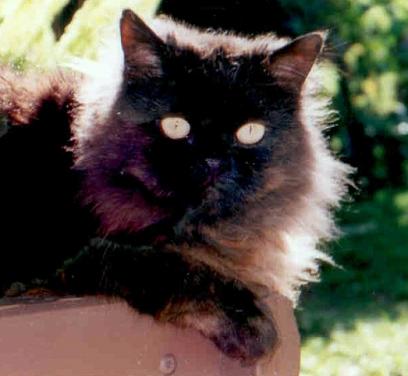The death of a pet or having to have a pet euthanased is a loss that can’t be measured accurately. Everyone has a different relationship with their pets, but there is no doubt that for the majority of, if not all, pet owners a pet’s death affects them deeply. The importance of acknowledging the role our pets play in our lives and allowing ourselves to grieve in whichever way suits us as an individual best, can’t be overstated.
It can be easy to be surprised by the depth of grief caused by the death of a pet. I had to make the decision to euthanase my old cat several months ago. He was at least fifteen years old, a stray – so I didn’t know his exact age. I was nineteen and in my first year at Uni when he allegedly followed my younger sister home from the shops. He was a scruffy, chocolate brown, Persian cross with yellow eyes. He won my parents over on the first night with the loudness of his purr, and stayed on until now, fifteen years later. I tried to talk to myself professionally. I told myself that not only was he very old, but that he had been unwell for some time and was ready to die. My mother had told me over the phone that he had lost all interest in food in the last two days, and he was barely moving. I knew I didn’t want to put him through a barrage of diagnostic tests and procedures and have him spend his last few days or maybe weeks in and out of hospital. I knew on a logical level that that would not have been kind to him. I tried to will myself away from grief because I knew from a humane point of view, and very likely from a medical point of view this was the right decision. And yet…there was doubt, because I did not want to let this cat go, let alone be the one to make the decision to let him go. I was getting ready to drive to my parents’ house to euthanase him when my mother phoned to say he’d died. He had saved me from having to make and carry out the decision to euthanase him. I was relieved and devastated.
We all grieve differently and process grief differently. The most important thing is not to follow what many of us perceive as social norms and suppress grief over the loss of a pet. The most important thing to do is to acknowledge your grief and then find a way to honour the memory of your pet that you are comfortable with and that helps you through this experience. It could be burying your pet in the garden with their favourite toy. It might be printing, framing, and hanging a favourite photograph of them with the rest of your family photos. It might be planting a tree in their honour. It might be having them cremated and scattering their ashes. It might be sharing memories of the funniest or naughtiest things your pet did in its life, with other family members. It might be keeping their collar or a little bit of their fur tied with ribbon. It might be making a donation to an animal welfare organisation in their name. There are as many different ways to grieve as there are people and pets in the world.
The afternoon that my old cat died, I did what I needed to do to help me look my grief in the face and cry. I did what I needed to do to let go of my professional voice that wanted me to view such an emotional issue with logic. I wrote.
In loving memory of Kaspar

The little brown cat followed my sister home from the shops.
Supposedly.
Knowing my sister, she probably led him with a scent trail of something tasty. Golden pools of late afternoon sun for eyes and the chocolate swagger of his tail begged my parents for asylum from stray-catdom. His real cat’s purr – loud enough to hear across a room – was loud enough to make his case for joining the family.
He stayed comfortably draped across our lives, perfectly meeting an unspoken need for his soothing presence in the house, until this Sunday when he slipped unobtrusively out, leaving many memories and a little brown cat shaped hole in each of us.
Written by Dr Anita Link of Wilston Vet

